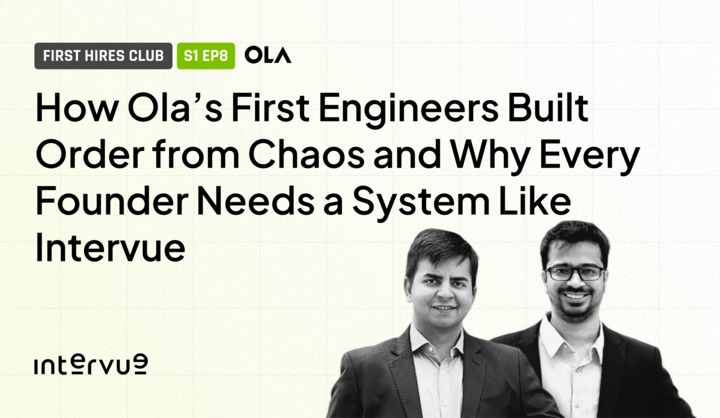Overview
Introduction
Why Effective Interviewing Matters
Preparing for the Interview
Conducting the Interview
Evaluating Candidates
Making the Decision
Post-Interview Process
Summing It Up
Your hiring needs to get stronger
Stay updated with our latest blog posts
Hiring the right talent is a critical task that can make or break a team’s success. As a hiring manager, it's essential to master the art of interviewing to ensure you select candidates who not only fit the job requirements but also align with your company culture.
This comprehensive guide will walk you through the key steps and strategies to conduct effective interviews, backed by relevant statistics and actionable tips. Let's dive in!
Interviewing is more than just asking questions and evaluating answers. It's about understanding the candidate's potential, assessing their fit within the team, and making informed decisions that benefit the organization in the long run.
According to a study by LinkedIn, 83% of talent say a negative interview experience can change their mind about a role they once liked. Therefore, refining your interview process is crucial.
Preparation is the foundation of a successful interview. Here’s how to set the stage:
Define the Role Clearly
Start by defining the role you are hiring for. Create a detailed job description that outlines the key responsibilities, required skills, and experience. This clarity helps you target the right candidates and set clear expectations.
Key Point: A clear job description can attract up to 50% more qualified applicants (Glassdoor).
Craft a Structured Interview Plan
A structured interview plan ensures consistency and fairness. Develop a list of questions tailored to the role and aligned with the key competencies you're seeking.
Tip: Use the STAR method (Situation, Task, Action, Result) to frame behavioral questions.
Review Candidate Resumes Thoroughly
Before the interview, review the candidate’s resume and cover letter. Highlight any areas that need further clarification and prepare specific questions related to their experience.
During the interview, your goal is to create a comfortable environment while gathering the information needed to make an informed decision.
Build Rapport
Start the interview with some small talk to put the candidate at ease. This helps in getting more authentic responses later in the conversation.
- Example: "How was your journey here today?" or "I see you have experience in [specific industry], how did you get started there?"
Ask Open-Ended Questions
Open-ended questions encourage candidates to elaborate and provide more detailed responses.
- Sample Questions:
- "Can you describe a challenging project you worked on and how you handled it?"
- "What motivates you to perform well in your job?"
Focus on Behavioral Questions
Behavioral questions give insight into how candidates have handled situations in the past, which is often a good predictor of future performance.
- Examples:
- "Tell me about a time when you had to overcome a significant challenge at work."
- "Describe a situation where you had to work with a difficult team member."
Assess Cultural Fit
Cultural fit is crucial for long-term success. Ask questions that help determine if the candidate shares the values and work ethic of your organization.
- Questions:
- "What type of work environment do you thrive in?"
- "How do you handle feedback and criticism?"
After the interview, it's time to evaluate and compare candidates effectively.
Use a Scoring System
Implement a scoring system to objectively assess candidates based on predefined criteria. This can include categories like skills, experience, cultural fit, and overall impression.
Stat: Companies that use structured interviews and scoring systems are 24% more likely to hire successful employees (Harvard Business Review).
Gather Multiple Perspectives
If possible, involve other team members in the interview process and gather their feedback. Different perspectives can provide a more comprehensive evaluation.
Tip: Hold a debrief meeting with all interviewers to discuss each candidate’s strengths and weaknesses.
Check References
Reference checks can validate a candidate’s experience and provide additional insights. Prepare a list of questions to ask references that align with the key competencies of the role.
- Example Questions:
- "Can you provide an example of how the candidate handled a challenging situation?"
- "How would you describe the candidate’s work ethic and reliability?"
Once you have gathered all the information, it’s time to make a decision.
Weigh the Pros and Cons
Create a list of pros and cons for each candidate. This helps in comparing them objectively and making a well-rounded decision.
Trust Your Instincts
While data and feedback are crucial, don’t ignore your instincts. If something feels off, it’s worth considering why you feel that way.
Stat: 85% of HR professionals believe that trust in their intuition is a key factor in making the right hiring decisions (SHRM).
Communicate Clearly
Once a decision is made, communicate promptly and professionally with all candidates. Provide feedback to those who were not selected to maintain a positive candidate experience.
The interview process doesn’t end once the decision is made. Here’s what to do next:
On-boarding and Integration
Ensure a smooth onboarding process for the new hire. A well-structured onboarding program can improve employee retention by 82% (Glassdoor).
Continuous Improvement
Always seek to improve your interview process. Gather feedback from candidates and team members to identify areas for improvement.
Tip: Conduct regular training for interviewers to keep them updated on best practices and legal requirements.
Interviewing is both an art and a science. By preparing thoroughly, asking the right questions, and evaluating candidates objectively, you can improve your chances of making successful hires. Remember, every interview is an opportunity to learn and refine your process. Keep evolving, and you’ll build a team that drives your organization forward.
Your hiring needs to get stronger
Stay updated with our latest blog posts






